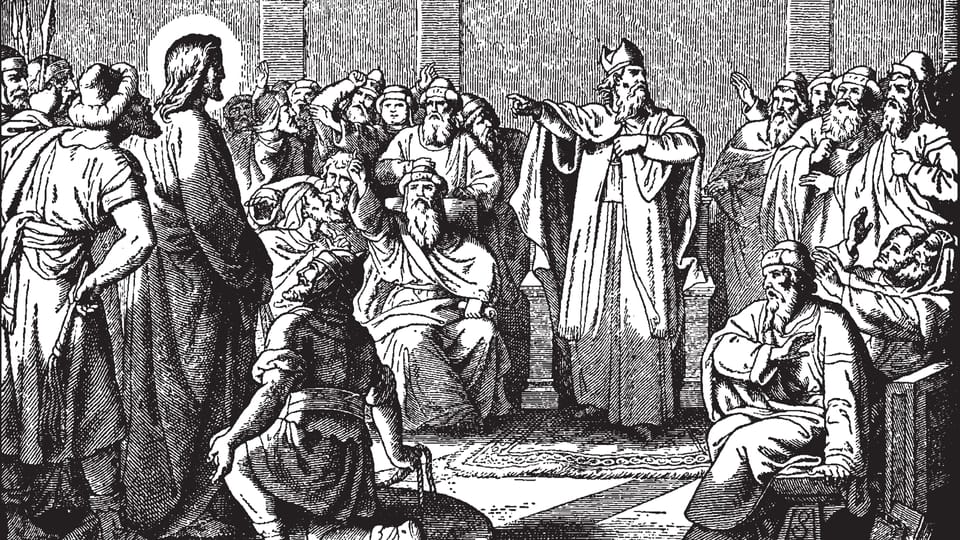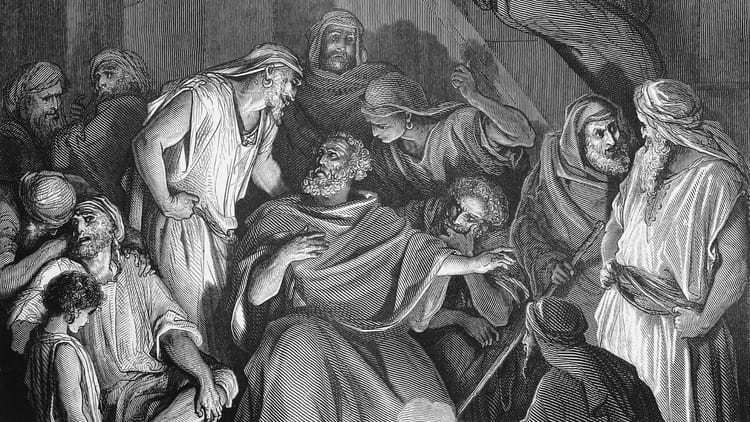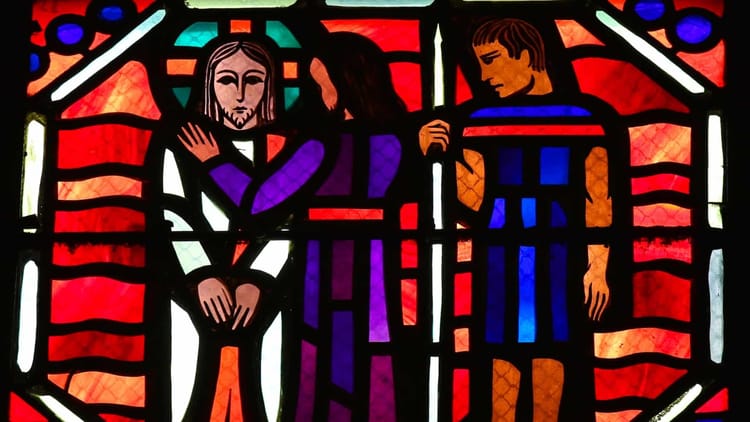Jesus’ Purpose and Our Response (Mark 14-15)

Big Idea: Jesus purposely went to the cross, and we must respond.
So much can happen in a short time. It only takes a very short time for everything to change, for our worlds to be turned completely upside-down.
In Mark 14 and 15, we have what’s called the Passion Narrative of Jesus Christ. They record the events that took place the night before and the day of Jesus’ death.
This is the climax of Mark’s gospel. Mark moves at a brisk pace as he records his account of Jesus’ life, but it’s as if he slows down here and walks with us scene by scene through the last hours of Jesus’ life before the cross. It’s as if time slows through all the events recorded in these chapters, and that it speeds up as the time as Jesus moves quickly to the cross.
There’s so much here:
- In Mark 14, you have the plot to kill him, his anointing, his last supper with the disciples, his arrest, and arraignment, and more.
- In Mark 15, you have his appearance before Pilate, his conviction, his being mocked, as well as his crucifixion, death, and burial.
So much happens in these two chapters that I could easily preach at least nine sermons on these events.
So much happens in these two chapters. Everything changes. How do we make sense of everything that happens in these two chapters?
Let me suggest two themes that stand out in these chapters.
One: Jesus purposely went to the cross.
One thing that stands out in these two chapters is how purposeful Jesus is. Jesus is not a victim of circumstances. It would be easy to assume that Jesus must have been caught up in circumstances beyond his control, that the plans of the religious leaders or the passion of the crowds led him to his death. Nothing could be further from the truth. In the events of these two chapters, Jesus remains firmly in control. He purposely went to the cross for us.
Let me give you just a few examples:
- When Jesus is anointed by a woman in the first part of chapter 14, he interprets the anointing in light of his coming death. He knows what’s going to happen. None of this is taking him by surprise. He knows exactly what’s going to happen.
- And then Jesus celebrates the Last Supper for his disciples. He takes the Passover celebration and uses it to show his disciples what’s about to happen: that he is our Passover lamb.
- Jesus knows what’s going to happen to his followers. In 14:27, he tells them that they’re all going to fall away. He especially knows what’s going to happen to Peter and Judas. None of this is taking him by surprise. Jesus knows everything that is about to take place. He is firmly in control.
- In the Garden, as he prays, he’s overwhelmed by what’s about to happen, but then submits to his Father’s will, saying, “Yet not what I will, but what you will” (14:36).
- He tells his disciples that his betrayer is coming before anyone knows in 14:42.
- He fulfills Scripture over and over again in what happens and what he says (14:49; 15:34, 36).
You read these two chapters, and you realize that Jesus is not being led to his death. Jesus is going to his death. The religious leaders, Sanhedrin, Pilate, crowds, and soldiers aren’t in charge; Jesus is in charge. As Jesus said in John 10:17-18: “I lay down my life … No one takes it from me, but I lay it down of my own accord.”
As Kent Hughes says:
Far from being crushed in the gears of history, Jesus was turning its wheels just as he wished. His death was no accident! In fact, the Last Supper and his words (“Take it; this is my body” and “This is my blood of the covenant, which is poured out for many,” vv. 22, 24) make no sense at all if Jesus was not master of his own death. Jesus maintained sovereign, premeditated, and detailed mastery.
What does this mean? It means a couple of things.
First, it means that Jesus’ death for us was no accident. Jesus knew exactly what he was doing. Just look at what he said as he celebrated the Passover meal with his disciples. He said, “This is my blood of the covenant, which is poured out for many” (Mark 14:24). Here he’s alluding to Isaiah 53:12 which says:
he poured out his soul to death
and was numbered with the transgressors;
yet he bore the sin of many,
and makes intercession for the transgressors.
Jesus went to the cross to offer his life for us. He did it to save you and me. Jesus shed his blood for our sins. He knew exactly what he was doing.
He was determined to suffer for his people. Because he was in charge, at any point, Jesus could have chosen not to go to the cross. But he was determined to go to the cross. “He decided by his own authority when he would give himself into the jaws of sin and death and judgment” (John Piper). As someone (Tim Keller) put it, “Death could not come to Christ. Christ came to death, and he walked into our execution room.”
Consider what Jesus faced. A few years ago, Mel Gibson released a movie called The Passion of the Christ. It portrayed the physical suffering that Jesus endured as he was flogged and killed. But the physical pain is nothing compared to the real suffering that he endured as he went to the cross.
No greater pain has ever been experienced on any level than the hell of Christ suffering in this moment. But why? Because he carried all of that pain, sin, guilt, and shame in that moment. Yet on a far deeper level he was forsaken and punished for us to reconcile us to God. (Tim Keller)
All of our sins were placed on him at that moment. Jesus bore the judgment of God for all that we had done wrong. But Jesus was no victim. Jesus willingly went to the cross to die for you and for me.
How amazing is it that Jesus did this for us! But that’s not all. A Savior who is in control even when his own life is ending is a Savior who can be trusted to sustain us in our darkest moments.
Jesus’ mastery of the events of these two chapters shows us his sovereignty and his love. We can have confidence in him because he’s sovereign, and we can be comforted because of his resolute love.
Jesus purposely went to the cross for us. But there’s another theme that also shows up in these two chapters.
Two: We must decide what we will do with Jesus.
If you read these two chapters, you notice how much Jesus is in charge. But you notice something else: everyone faces a verdict. What will they do with Jesus?
We may think we want to remain neutral, but over and over, Mark forces the issue on us:
- At the start of chapter 14, the religious leaders plot against Jesus, and some of those present grumble at the expense of the perfume used to anoint him, while a woman worships him. The question is placed before us: where do we stand? While we respond in love and adoration to him, or will we oppose him?
- Jesus tells the disciples that they will all fall away, but Peter argues. In Jesus’ moment of greatest need, Peter, James, and John all fall asleep, and later Peter denies Jesus three times. The question is placed before us: Do we realize that we are faithless, and that our only hope is Jesus who remained faithful even when we abandoned him?
- In chapter 15, Pilate asks the crowds, “What shall I do with the man you call the King of the Jews?” (15:12). They answer, “Crucify him!” The question is posed to us as well: what will we do with Jesus?
- As Jesus is crucified, we see people taunt him, but we also see a centurion who saw how Jesus died respond by saying, “Truly this man was the Son of God!” (Mark 15:39). We see women watching from a distance; we see Joseph of Arimathea wrapping his body and burying him in a tomb. The question is posed to us: Will we join the crowd of mockers, or will we recognize him for who he is?
As Jesus moves purposely to the cross, we see people abandon him, and we see people worship him. The question comes to us: what will you do?
As we face this question, I’m so grateful that there’s hope even for those who failed him in these chapters. Take Peter, who not only fell asleep on Jesus but who denied Jesus not just once but three times. What a bitter blow for Peter, who was so confident that he could be counted on. Peter had to realize that he didn’t have what it took, that he couldn’t count on his own goodness. His only hope was Jesus.
Here’s the good news: it was for people like Peter that Jesus died. Jesus died for the struggling, the faithless, those who’ve let him down. Jesus died for people like you and me.
My uncle is a pastor. Years ago, when I sensed a call to the ministry, I wrote to him and asked for his counsel. What would he say to a young want-to-be pastor like me?
He replied with a letter I still have: preach and teach for a verdict:
If there is one appeal I would make to you, if you wish to be a teacher, it is this. Preach and teach for a verdict! Call people to action in obedience to God’s Word. Merely to inform is not sufficient. Make the human will your target in the power of the Holy Spirit.
I can’t help but feel this is what Mark is doing in these chapters. He’s shown us what Jesus has done for us. He’s shown us that Jesus did all of this purposely for our sake. And then he’s calling for a verdict: what are we going to do about it? Will we trust him, or will we reject him?
If I were to summarize the message of these two chapters, here’s what I’d say: Jesus purposely went to the cross, and we must respond.
Jesus, fully in charge of everything that was taking place, went to the cross to offer his life for ours, to die in our place so that we could be made right with God.
As he did so, we see all kinds of reactions from people. Some plotted against him. One chose to betray him. Some grumbled. His closest followers fell away. His most adamant follower denied him three times. The crowds cried out, “Crucify him!” Soldiers and thieves taunted him.
But some worshiped him. A woman anointed him. A centurion acknowledged him to be the Son of God. Women looked on from a distance. Joseph buried him.
Some rejected him, but some followed him. Mark is pressing in on us: what will we do? How will we respond to the one who purposely went to the cross to die for sinful men and women like us?
So much can happen in a short time. In the space of a couple of days, all these events took place so that Jesus could die for us. A lot can happen right now too as we look to Jesus, as we come with empty hands and respond in repentance and faith, trusting Jesus and what he did for us that day.





